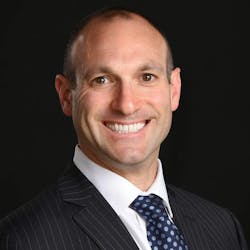Lowering the transmission and spread of human coronavirus with over-the-counter products
Certain oral antiseptics and mouthwashes may have the ability to inactivate human coronaviruses, according to a Penn State College of Medicine research study that tested several oral and nasopharyngeal rinses in a laboratory setting to assess their ability to inactivate human coronaviruses (HCoV), a virus similar in structure to severe SARS-CoV-2.1 The study found that several of the nasal and oral rinses had a strong ability to neutralize human coronavirus, which suggests that these products may have the potential to reduce the amount of viral spread by individuals who are COVID-19–positive.
Common over‐the‐counter nasal rinses and mouthwashes were tested for their ability to inactivate high concentrations of HCoV using contact times of 30 seconds, one minute, and two minutes. Reductions in titers were measured by using the tissue culture infectious dose 50 (TCID50) assay. To measure how much virus was inactivated, the researchers placed the diluted solutions in contact with cultured human cells. They counted how many cells remained alive after a few days of exposure to the viral solution and used that number to calculate the amount of HCoV inactivated as a result of exposure to the mouthwash or oral rinse being tested.
A 1% baby shampoo nasal rinse solution inactivated HCoV greater than 99.9% with a two-minute contact time. Several over‐the‐counter mouthwash products—including Listerine, hydrogen peroxide, and other mouth rinses with essential oils—were highly effective in inactivating infectious virus greater than 99.9%, even with a 30‐second contact time.
Researcher Craig Meyers, PhD, stated, "While we wait for a vaccine to be developed, methods to reduce transmission are needed. The products we tested are readily available and often already part of people's daily routines." According to Meyers, "People who test positive for COVID-19 and return home to quarantine may possibly transmit the virus to those they live with. Certain professions including dentists and other health-care workers are at a constant risk of exposure. Clinical trials are needed to determine if these products can reduce the amount of virus COVID-19–positive patients or those with high-risk occupations may spread while talking, coughing, or sneezing. Even if the use of these solutions could reduce transmission by 50%, it would have a major impact."
Future studies may include a continued investigation of products that inactivate human coronaviruses, as well as what specific ingredients in the solutions tested were responsible for inactivating the virus.
Editor’s note: This article originally appeared in Perio-Implant Advisory, a newsletter for dentists and hygienists that focuses on periodontal- and implant-related issues. Perio-Implant Advisory is part of the Dental Economics and DentistryIQ network. To read more articles, visit perioimplantadvisory.com and subscribe at this link.
References
1. Meyers CM, Robison R, Milici J, et al. Lowering the transmission and spread of human coronavirus. J Med Virol. 2020. Published online: September 17, 2020. doi:10.1002/jmv.26514
About the Author

Scott Froum, DDS
Editorial Director
Scott Froum, DDS, a graduate of the State University of New York, Stony Brook School of Dental Medicine, is a periodontist in private practice at 1110 2nd Avenue, Suite 305, New York City, New York. He is the editorial director of Perio-Implant Advisory and serves on the editorial advisory board of Dental Economics. Dr. Froum, a diplomate of both the American Academy of Periodontology and the American Academy of Osseointegration, is a volunteer professor in the postgraduate periodontal program at SUNY Stony Brook School of Dental Medicine. He is a PhD candidate in the field of functional and integrative nutrition. Contact him through his website at drscottfroum.com or (212) 751-8530.

